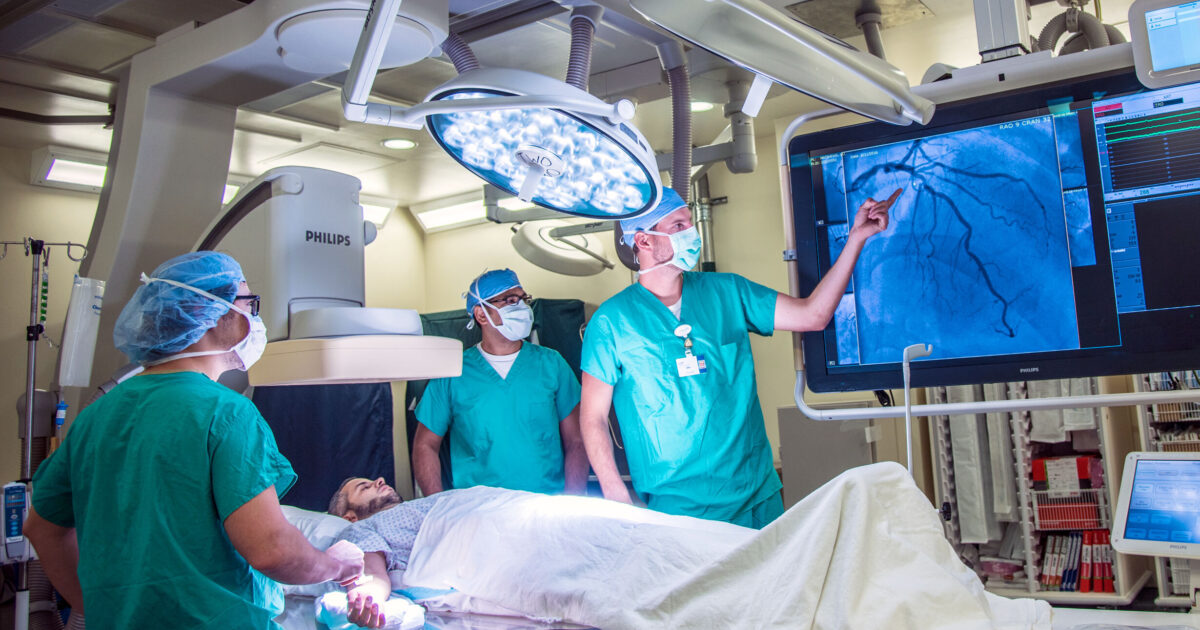5 ways Dr Garcia recommends improving your heart health today
5 ways Dr Garcia recommends improving your heart health today
Blog Article
Comprehending the Relevance of Cardiology in Modern Medical Care Providers
Cardiology plays a vital function in modern healthcare, especially as heart condition proceeds to be the leading reason for death worldwide. Advances in diagnostics and therapy have actually changed patient treatment, enabling earlier interventions and enhanced outcomes. Furthermore, the change in the direction of precautionary cardiology equips individuals to handle their health and wellness proactively. As modern technology proceeds to advance, the assimilation of innovative options might further redefine cardiology's influence on public health and wellness, motivating a better evaluation of emerging patterns and their effects.
The Prevalence of Heart Problem and Its Effect On Public Health
Although heart problem continues to be the leading cause of fatality worldwide, its influence prolongs far past private patients to impact public health and wellness systems and economies. The high prevalence of cardiovascular disease puts a considerable pressure on medical care resources, necessitating enhanced financing for prevention, recovery, and treatment programs. Public health initiatives must attend to threat elements such as weight problems, cigarette smoking, and sedentary way of livings, which add significantly to the increasing incidence of heart conditions.Moreover, the economic burden linked with cardiovascular disease is tremendous, including not only direct medical expenses yet additionally indirect expenses associated with shed performance and early death. Areas face obstacles in managing these costs, often causing variations in health care access and end results. As the populace ages and lifestyle-related threats remain to escalate, the necessity for effective cardiology interventions comes to be critical. Attending to heart disease is not only a matter of private health but additionally an essential public health concern.
Breakthroughs in Cardiac Diagnostics and Imaging Techniques
Current advancements in cardiac diagnostics and imaging techniques have actually reinvented the field of cardiology, boosting the capacity to keep track of and find cardiovascular disease. Techniques such as heart MRI, CT angiography, and echocardiography have actually come to be progressively innovative, supplying in-depth images of heart frameworks and functions. These modalities enable the very early identification of conditions like coronary artery illness, cardiac arrest, and valvular disorders.Moreover, improvements in non-invasive diagnostics, such as wearable modern technology and remote surveillance tools, have equipped people and doctor. These devices help with real-time tracking of heart rhythms and various other vital signs, leading to timely interventions. Furthermore, man-made intelligence is being incorporated into imaging evaluation, improving accuracy and effectiveness in medical diagnosis.
Developments in Treatment Alternatives for Heart Conditions
Current advancements in cardiology have actually resulted in considerable technologies in treatment choices for heart conditions. These consist of sophisticated surgical techniques that enhance procedural results and emerging medicines that use new methods for therapy. As the field develops, these advancements play an essential duty in enhancing patient care and end results.
Advanced Surgical Techniques
Developments in surgical strategies have changed the landscape of cardiology, providing brand-new wish for people with heart problems. Minimally invasive treatments, such as catheter-based treatments, have actually substantially minimized healing times and medical facility keeps. Techniques like robotic-assisted surgical procedure improve accuracy, allowing surgeons to navigate intricate anatomical frameworks with higher accuracy. Advancements in imaging innovation promote real-time visualization throughout procedures, enhancing results. Transcatheter aortic valve replacement (TAVR) exhibits an innovation in treating aortic stenosis, allowing shutoff replacement without open-heart surgical procedure. Additionally, hybrid methods that integrate surgical and catheter-based techniques give tailored remedies for various cardiac problems. These sophisticated medical methods not only enhance client security yet also increase therapy options, underscoring the vital function of technology in contemporary cardiology methods.
Arising Treatments and medications
As the landscape of cardiology remains to evolve, arising treatments and drugs play a crucial function in boosting therapy alternatives for heart conditions. Developments such as novel anticoagulants and progressed lipid-lowering representatives have transformed the administration of heart diseases, considerably minimizing individual morbidity and death. Furthermore, the development of gene therapies and regenerative medicine offers promising opportunities for dealing with conditions previously deemed incurable. Medical trials are consistently revealing the efficacy of these treatments, pushing the boundaries of conventional treatments. The assimilation of digital wellness technologies facilitates personalized medicine, enabling for tailored therapy plans based on hereditary and way of living aspects. Collectively, these advancements highlight the vibrant nature of cardiology, enhancing patient results and redefining requirements of treatment in modern healthcare.
The Function of Preventive Cardiology in Person Care
Preventive cardiology plays a necessary duty in person treatment by concentrating on the identification of danger elements that add to cardiovascular disease. Through lifestyle adjustment methods and very early detection techniques, doctor can successfully minimize the occurrence of cardio events - Cardiology care. This aggressive method not only boosts client end results but likewise advertises lasting health and wellness
Danger Element Recognition
While heart diseases continue to be a leading root cause of morbidity and mortality worldwide, efficient threat variable recognition serves as a foundation of preventive cardiology. Recognizing threat factors such as hypertension, hyperlipidemia, diabetic issues, and family members background is essential for early treatment. Health care professionals make use of numerous evaluating approaches to evaluate these aspects, allowing for customized preventative steps. Furthermore, understanding a person's lifestyle options, such as smoking cigarettes and physical lack of exercise, further notifies danger evaluations. This complete examination enables medical professionals to develop personalized care strategies focused on mitigating threats. By focusing on danger element recognition, health care systems can enhance individual outcomes and decrease the total problem of cardio conditions, ultimately contributing to enhanced public health approaches and resource allocation.
Way Of Living Modification Strategies
A plethora of studies highlights the crucial role of way of life alteration strategies in lowering cardiovascular illness threat. These strategies encompass nutritional changes, raised exercise, smoking cigarettes cessation, and weight administration. By taking on a heart-healthy diet abundant in fruits, veggies, entire grains, and lean proteins, individuals can lower cholesterol levels and blood pressure. Regular exercise reinforces the heart and improves general cardio health. Additionally, quitting cigarette smoking substantially reduces the danger of heart problem and improves recuperation prices for those with status quo. Weight monitoring further adds to cardio health by mitigating various other danger factors such as diabetes mellitus and hypertension. Carrying out these way of living alters not only promotes specific wellness but likewise acts as a keystone of preventive cardiology in patient care.
Early Detection Strategies
Way of living adjustments substantially add to decreasing cardio illness dangers, but they are most effective when coupled with early discovery techniques. Precautionary cardiology emphasizes the value of identifying prospective heart problems before they rise into major conditions. Methods such as high blood pressure monitoring, cholesterol screening, and progressed imaging modern technologies like echocardiograms play vital roles in evaluating cardiovascular health. Biomarkers and genetic screening also boost the precision of early discovery, enabling for tailored preventative methods. Normal cardiac threat assessments equip health care service providers to intervene proactively, potentially stopping heart assaults and strokes (Cardiologist near me). By incorporating these very early detection methods into regular treatment, individuals can take advantage of prompt way of life treatments and targeted treatments, ultimately enhancing and boosting end results high quality of life
Integrating Innovation Into Cardiology Practices
As improvements in innovation remain to improve different areas, the integration of innovative devices and systems into cardiology techniques has ended up being vital for boosting individual care and outcomes. Telemedicine systems permit cardiologists to check patients remotely, enhancing access to care while minimizing the burden on healthcare centers. Wearable tools, such as smartwatches, allow continuous heart rate monitoring, alerting both individuals and medical professionals to possible problems in real-time. Furthermore, fabricated knowledge (AI) is being used to examine huge amounts of heart data, helping in early diagnosis and customized therapy plans. Advanced imaging methods, consisting of 3D echocardiography, enhance visualization of heart frameworks, causing much more specific interventions. Digital wellness documents (EHRs) enhance client info administration, making certain that cardiologists have prompt access to crucial information. Together, these technical innovations are transforming cardiology, promoting positive monitoring and boosted wellness end results for clients with cardiovascular problems.
The Significance of Individual Education And Learning and Interaction
Client education and involvement play an essential function in the monitoring of cardio health and wellness. By gearing up patients with expertise about their problems, therapy choices, and lifestyle adjustments, doctor empower individuals to take an active function in their treatment. This positive technique can cause boosted adherence to prescribed medications, dietary changes, and exercise routines, ultimately decreasing the risk of complications.Engagement additionally cultivates a solid patient-provider partnership, encouraging open interaction and depend on. When patients feel educated official site and entailed, they are most likely to voice problems and ask questions, which can result in much better medical results. Additionally, educational resources, such as workshops or electronic systems, can enhance understanding and advertise self-management methods. Generally, prioritizing individual education and learning and interaction is essential for boosting cardiovascular wellness, boosting high quality of life, and lowering healthcare costs connected with cardio conditions.
Future Patterns in Cardiology and Their Prospective Impact

Frequently Asked Concerns
What Way Of Life Adjustments Can Lower Cardiovascular Disease Risk?
The present inquiry addresses lifestyle changes that can considerably reduce heart problem threat. Dr Garcia. Embracing a well balanced diet plan, participating in regular exercise, preserving a healthy weight, taking care of stress and anxiety, and staying clear of cigarette can significantly improve cardiovascular wellness
Just How Can I Acknowledge Early Signs of Heart Troubles?
Acknowledging very early indications of heart troubles includes monitoring signs such as chest pain, shortness of breath, tiredness, and irregular heartbeat. Timely awareness of these signs can prompt necessary medical examination and intervention for far better end this article results.
What Are the Differences In Between Cardiologists and Cardiac Surgeons?
The differences between cardiologists and heart cosmetic surgeons depend on their roles; cardiologists largely manage and identify heart conditions with non-invasive approaches, while heart doctors execute medical treatments to fix architectural heart issues. Each plays an essential, next distinctive function.

Exactly how Frequently Should I Obtain My Heart Health And Wellness Checked?
The regularity of heart checkup varies based on individual threat variables. Typically, grownups ought to undergo assessments every one to 2 years, while those with status quo might need even more constant evaluations as suggested by medical care professionals.
What Duty Does Genetics Play in Cardiovascular Disease Threat?
Genetics considerably influences cardiovascular disease danger, with familial patterns showing inherited conditions. Specific genetics can incline people to hypertension, cholesterol issues, and various other cardiovascular issues, highlighting the significance of genetic screening in examining heart health and wellness. Heart disease continues to be the leading cause of fatality globally, its impact expands much past individual clients to affect public health and wellness systems and economic situations. Public health and wellness initiatives should deal with threat variables such as weight problems, smoking, and inactive way of livings, which contribute significantly to the climbing incidence of heart conditions.Moreover, the economic problem associated with heart condition is tremendous, incorporating not only direct medical costs however also indirect costs related to lost performance and early mortality. Preventive cardiology plays an essential function in client care by focusing on the identification of risk factors that contribute to heart disease. Synthetic knowledge (AI) and machine knowing are boosting diagnostics and individual surveillance, enabling early detection of heart conditions. The distinctions in between cardiologists and cardiac surgeons exist in their functions; cardiologists primarily manage and diagnose heart problems via non-invasive techniques, while cardiac doctors do medical procedures to correct structural heart issues.
Report this page